Background
Oingo Boingo had only achieved limited success in Brazil until 1988, when the "live in the studio" double album Boingo Alive brought the band to the top of the charts. Four songs from the album, namely "Stay", "Just Another Day", "Dead Man's Party" and "Not My Slave", became major hits on the Brazilian charts during 1989–1990. This led Polygram Records (the Brazilian MCA representative) to release a compilation album for the band, using the title of the band's hit song "Stay", which had also been featured in the Brazilian soap opera Top Model.
Despite the fact that the radio hits in Brazil were the re-recorded versions from Boingo Alive, the LP presented the original studio recordings of the songs. When the album was issued on CD, the studio versions of "Just Another Day", "Dead Man's Party" and "Not My Slave" were replaced with the versions from Boingo Alive, and the re-recording of "Who Do You Want to Be?" added as a bonus track.

Oingo Boingo was an American new wave band formed by songwriter Danny Elfman in 1979. The band emerged from a surrealist musical theatre troupe, The Mystic Knights of the Oingo Boingo, that Elfman had led and written material for in the years previous. Their highest-charting song, "Weird Science", reached No. 45 on the US Billboard Hot 100.

Dead or Alive were an English pop band that released six studio albums from 1984 to 1995. The band formed in 1980 in Liverpool and found success in the mid-1980s, releasing seven singles that made the UK top 40 and three albums on the UK top 30. At the peak of their success, the lineup consisted of Pete Burns (vocals), Steve Coy (drums), Mike Percy (bass) and Tim Lever (keyboards), with the core pair of Burns and Coy writing and producing for the remainder of the band's career due to Percy and Lever exiting the group in 1989.

The Hollies are an English rock and pop band formed in 1962. One of the leading British groups of the 1960s and into the mid-1970s, they are known for their distinctive three-part vocal harmony style. Allan Clarke and Graham Nash founded the band as a Merseybeat-type group in Manchester, although some of the band members came from towns further north, in east Lancashire. Nash left the group in 1968 to form Crosby, Stills & Nash, though he has reunited with the Hollies on occasion.
"Minnie the Moocher" is a jazz-scat song first recorded in 1931 by Cab Calloway and His Orchestra, selling over a million copies. "Minnie the Moocher" is most famous for its nonsensical ad libbed ("scat") lyrics. In performances, Calloway would have the audience and the band members participate by repeating each scat phrase in a form of call and response, eventually making it too fast and complicated for the audience to replicate.
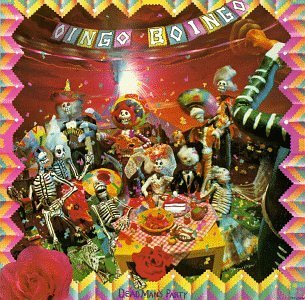
Dead Man's Party is the fifth album by American new wave band Oingo Boingo, released in 1985. The album contains the only two singles by the band to chart on the Billboard Hot 100: "Weird Science" at number 45, and "Just Another Day" at number 85.

Dead Bands Party: A Tribute to Oingo Boingo is a tribute album by various artists to the band Oingo Boingo.

Boi-Ngo is the sixth studio album by American new wave band Oingo Boingo, released in 1987.
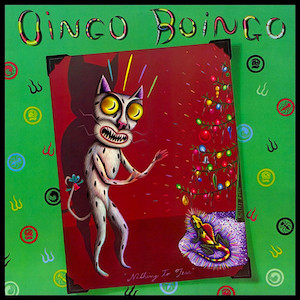
Nothing to Fear is the second studio album by American new wave band Oingo Boingo, released in 1982 on A&M Records.

So-Lo is the debut studio album by American musician Danny Elfman, released in 1984 by MCA Records. Recorded primarily by Elfman, but also featuring the members of his band, Oingo Boingo, it was recorded when Elfman was offered a solo contract with MCA after the band had been dropped from I.R.S. Records. The album marked the band's last release to feature bassist Kerry Hatch and keyboardist Richard Gibbs.
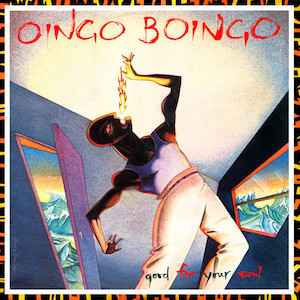
Good for Your Soul is the third studio album by American new wave band Oingo Boingo, released in 1983. It was produced by Robert Margouleff and was the band's last album to be released on A&M Records.

Boingo Alive is a double album by American new wave band Oingo Boingo, released in 1988. It was performed and recorded live in a rehearsal studio with no audience, with the band performing songs from previous albums and two previously unreleased songs to celebrate the 10th anniversary of the band's beginning.
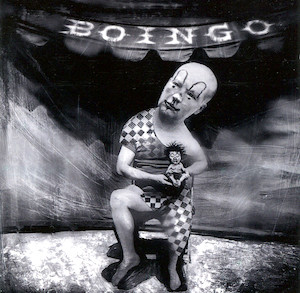
Boingo is the eighth and final studio album by American new wave band Oingo Boingo. It was the band's only album recorded for their new label, Giant Records, as well as the only album to be released by the band's 1994–95 line-up.

Farewell: Live from the Universal Amphitheatre, Halloween 1995 is a double live album and home video release by American new wave band Oingo Boingo, documenting their final concerts and ending on Halloween night of 1995. The band played a series of five nights, ending on Halloween night by playing more than 44 songs during a 4-hour set that went past midnight. As with all of their live shows, the setlist included songs from across the band's large discography, many of which were given new arrangements.
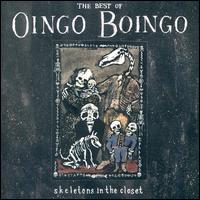
The Best of Oingo Boingo: Skeletons in the Closet is a compilation of songs by American new wave band Oingo Boingo. It features songs recorded during the band's tenure with I.R.S. Records/A&M Records, culled from the albums Only a Lad (1981), Nothing to Fear (1982) and Good for Your Soul (1983).

Best O' Boingo is the second greatest hits album from American new wave band Oingo Boingo, released in 1991 by MCA Records. It features songs recorded during the band's years on MCA Records, from 1984's So-Lo through 1990's Dark at the End of the Tunnel. As such, the songs from the period when the band was on I.R.S. Records—as well as several others—are represented here by their re-recorded versions from the 1988 "live in the studio" album Boingo Alive.

"Secret Agent Man" is a song written by P. F. Sloan and Steve Barri. The most famous recording of the song was made by Johnny Rivers for the opening titles of the American broadcast of the British spy series Danger Man, which aired in the U.S. as Secret Agent from 1964 to 1966. Rivers's version peaked at #3 on the Billboard Hot 100 and #4 on the Canadian RPM chart, one of the biggest hits of his career. Numerous covers and adaptations have been recorded since then with the song becoming both a rock standard and one of Johnny Rivers's signature songs.

Private Life: The Compass Point Sessions is a compilation album constisting of recordings by recorded by Jamaican singer and songwriter Grace Jones released in 1998 by Island Records. The two-disc anthology consists mostly of material pulled from 1980–1982 recording sessions.

"Weird Science" is a song by American new wave band Oingo Boingo. Written by frontman Danny Elfman, it is the theme song to the Weird Science film and television series. It was released on the film's soundtrack, as well as Oingo Boingo's fifth studio album, Dead Man's Party (1985), in a longer mix. The song reached No. 45 on the US Billboard Hot 100, No. 21 on the US Dance Club Charts, and No. 81 in Canada. It is Oingo Boingo's most successful single.
The discography of Oingo Boingo, an American new wave band, consists of eight studio albums, two live albums, five compilation albums, two extended plays, one soundtrack, seventeen singles, ten music videos, and a list of soundtrack appearances.
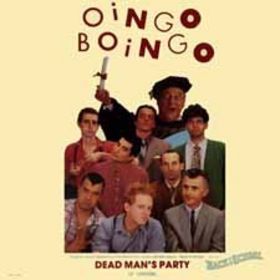
"Dead Man's Party" is a song by American band Oingo Boingo, released as the third single from their album of the same name.


















